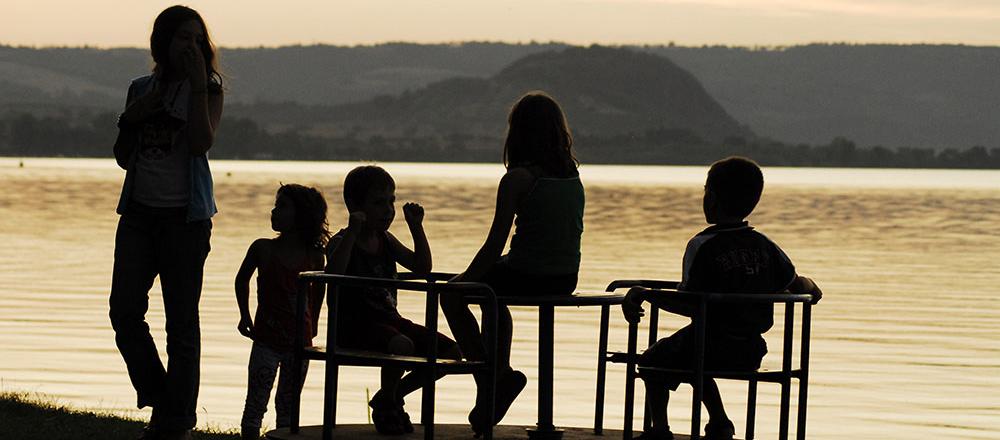
The serious illness of a parent or guardian causes many disruptions in families with young children. When parents become ill, they have needs dictated by their bodies and their medical care, and they may face challenges in accomplishing many tasks that used to seem easy. Young children may fill roles that did not exist when their parents were well, such as reminding a parent to take medications and carrying out other nursing activities, or they may become more involved in chores around the home or watching younger siblings.
For the past 15 years, I have studied children’s caring to offer frameworks to professionals and families grappling with severe illness. My work has led me to the southern African country of Zambia, where I carried out a long-term study with children (ages 8 through 12) whose parents and guardians suffered from tuberculosis, an airborne disease commonly associated with HIV in sub-Saharan Africa. Both HIV and tuberculosis are considered epidemics in Zambia, having hit hardest adults in their most productive years who are often parents, grandparents, or aunts and uncles with considerable child-rearing responsibilities.
Consider Maureen, whom I met in 2007. She suffered from both HIV and tuberculosis and acknowledged that her son and daughter, ages 12 and 8, provided most of her care. She told me once: “The children are taking good care of me. People would think it’s the elders who are helping and cleaning the place, but it is the children.” Maureen drew attention to the quality of her children’s care. The children were not just taking care; they were taking good care of her. Their care was so good that people would think it was “the elders.” However, the elders—her mother, brother, and other adult relatives—had their own care needs and demands, so were unable to help her as much as she needed. Months later, after Maureen completed had completed her treatment for tuberculosis, she observed that her recovery was due, in large part, to her children’s care.
Zambia may seem quite distant from the United States. Yet even in the US, many health professionals, families, educators, and neighbors intuitively know that children provide some level of care or support during parental illness, whether for cancer, addiction, HIV, or any number of other mental and physical conditions. How do we—as professionals, concerned community members, or family—support children who care? The answers are not simple. However, they start by acknowledging what children do to give care and then listening to children’s perspectives on their care and their needs as well what they view as meaningful assistance.
Whether you are a health policymaker, medical provider, community member, or family member, there are things you can do to support children whose parents are ill.
- First, an important step in helping children who give care is to acknowledge and offer support to all informal caregivers, regardless of age. Too often our health policies and medical interventions focus only on individual treatment and behavior change. They ignore the relationships that affect wellbeing. Likewise, addressing the broader social determinants of health would benefit children when parents or guardians both remain healthier and have easier access to care.
- Second, programs aimed at helping children who give care must seek children’s input. Children who have cared for loved ones bring firsthand experience and knowledge and can help formulate sensible solutions that fit the context.
- Third, when teaching, coaching, or mentoring a young person who has substantial caring responsibilities, accommodate their schedules so they can participate in activities.
- Finally, recognition and willingness to listen, whether from a physician, teacher, parent, or family member, can go a long way to acknowledging children’s care and opening up a dialogue about their needs.
In my work in Zambia (see my book), children gave care under dire circumstances because of the financial situations of their families, the severity of illnesses their guardians faced, and the absence of structures to support persons who were sick and their families. Still, the children did not want to be pitied. Instead, they wanted people to recognize and appreciate their efforts. When family members, clinical providers, and well-meaning community members attempted to prevent children from participating in parental care, they felt distressed. Maureen’s children, for example, believed that they were the most knowledgeable caregivers. They were the people who were most invested in her recovery and had the most to lose if she did not get better. These may not be the experiences of all children, and that is why it is important to listen to children’s perspective before making assumptions about their lives and needs.
Written by: Jean Hunleth, Ph.D., MPH
Jean Hunleth, Ph.D., MPH, is an instructor of surgery at Washington University School of Medicine. She is a cultural anthropologist who has trained and worked in public health. Her research focuses on the experience of caregiving and treatment seeking for infectious and chronic diseases. She is also the author of Children as Caregivers: The Global Fight against Tuberculosis and HIV in Zambia.